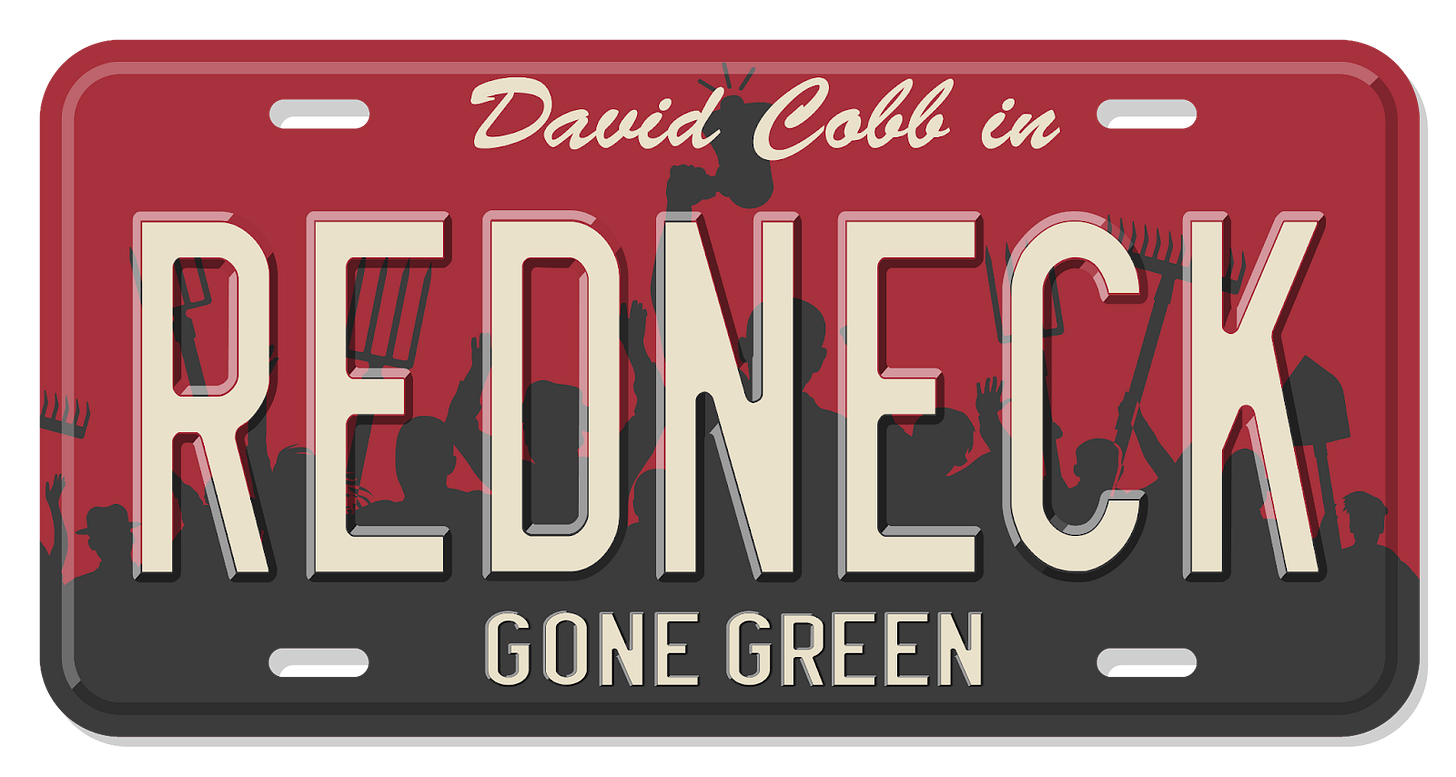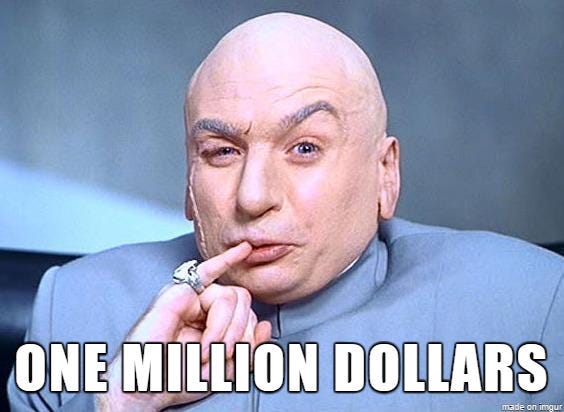Howdy Y’all,
We are grateful that you are part of the growing Redneck Gone Green community. A reminder that in addition to this weekly writing, we also broadcast live every Monday at the 3pm pacific, 6pm eastern on the Democracy at Work YouTube channel.
Our next live show will be Monday, April 21 at 3pm pacific, 6pm eastern. Our guest will be Susanna Penfield. You can join the conversation and make live comments on YouTube by clicking here
I hope you can join us live, which allows you to make live comments on YouTube. Just click here. If not, remember that you can always access the recording (both video and audio) by becoming a subscriber on the Redneck Gone Green Youtube channel by clicking here.
As y’all know, I normally write an essay which serves as a “deep dive” companion piece to the live broadcast. But this week we are gonna do something different. With Susanna’s permission, I am reprinting an essay that she wrote for her own substack. I am a subscriber to The Busted Chronicles, and you should be too!
Onward to the world we deserve,
David Cobb, The Redneck Gone Green
Susanna Penfield
As an inheritor of intergenerational wealth, Susanna is dedicated to disrupting cycles of power from within privilege. Her work began personally, with years spent working to align inherited assets with social and ecological justice, ultimately leading to a family “trust bust." She now applies this experience as Director of Relationships at Chosen Family Office, where she facilitates connections between wealth holders and financial professionals in support of social-movement-driven wealth redistribution. Susanna holds an MSc in Gender Studies from the London School of Economics, where her research focused on the role of white feminine guilt in disrupting narratives of wealth, and is now entwining that work with her personal money journey through a substack titled The BUSTED Chronicles. Susanna earned a BA in Political Science and Feminist and Gender Studies from Colorado College. Born and raised in Vermont, she now lives with her partner in Albuquerque, New Mexico.
Guilt, shame and the difference
Starting with myself.
By Susanna Penfield
When I was 23, I learned that I had inherited a million dollars.
Or rather, I learned that 13 years earlier, a trust fund had been set up with my name on it. One that had continued to grow, unknown to me, each year since. It marched on through my grandfather’s death, past my high school and college graduations — making itself known only through the email I received at age 21 and then quickly dismissed because of little context or conversation. So it sat, for two more years, until I stumbled into a group of young, rich alumni from my private, liberal arts college.
These alumni were members of a group called Resource Generation. Young people with wealth and class privilege, often inheritors, who were committed to redistribution in alignment with (and alongside) movements for social justice. These alumni were transparent about their financial access, as well as the legacy, and harm, of their family’s wealth.
They prompted me to ask similar questions — how money in my family was earned, where it lived. In other words, they modeled a practice I would become all too familiar with over the next couple of years: sharing a money story.1
Without this push, who knows when I would have returned to that email and opened that link. Without that community, who knows when I would have felt emotionally equipped to engage head on with the responsibility that comes with finding seven digits in your bank account as a recent college graduate.
And here, I want to take a minute to put this number into context:
This number places me within the top 3% of net wealth for individuals ages 18-35 in the United States.2
It qualifies me as “a young person with wealth,” defined by Resource Generation as:3
An 18-35 year old with direct access to $1M or greater in liquidable assets (meaning it is invested in the stock market, bonds, or cash and not, for example, in a house).
An 18-35 year old who anticipates inheriting at least $5M in the course of their lifetime (recognizing that inheritance schedules vary greatly among individuals).
An 18-35 year old whose family’s net wealth is $10M or greater (this definition of “family” refers specifically to family of origin, rather than chosen family or community that shares wealth with each other).
Not only did this number feel overwhelming, but betraying.
Despite indications otherwise (financially stable upbringing, family travel, no student debt4), I did not consider myself rich. I had grown up in a small, rural, and economically-diverse town; spent my college years writing, speaking and organizing fellow students for justice; recently begun an AmeriCorps position in attempt to serve some sort of greater good; and was spending my off-work hours advocating for racial equity. In the narratives I knew, rich people were part of the problem. Not the solution.
I felt this number put me in direct opposition to the communities I wanted to be part of, the social movements I was participating in, the academic frameworks I had studied, and the identity I was claiming.
And, as 23 year old, all I wanted was a cohesive identity.
The accumulation of these assets over time represented my complicity in an ever widening wealth gap — one that grew along racial lines, immigration lines, socioeconomic lines. I was born into benefiting from systems that showed no interest in individual human lives.
And there was one overwhelming emotion: Shame.
For my dissertation, I did a lot of research on the psychology of shame. I learned that it is a distinct emotion from guilt, and that this distinction is important. One is internal (shame), while the other is external (guilt). We must learn to identify shame so that we can speak to it as a precursor to guilt, which itself can be a pathway to action.
I’ve created a comparative table of the two, based on my findings5678910:
The moment of discovering the trust fund is a feeling I return to:
One that began internally as shame: I am wrong for having this money.
Which then transformed into guilt: It is wrong that systems have enabled this money to exist only for my benefit.
That became action: I have the ability to move this money to places where it is actually needed.
I’ve simplified this progression, which was certainly not linear. But also, in essence and with help, it was.
Huge shoutout to the wonderful Morgan Curtis, a social justice giving and money coach, who I worked with for six months in 2021 at the onset of my redistribution. Morgan guided me through the panic of deciphering a surprise investment account, into the calm of creating and centering a personal economic vision that continues to orient my values around giving, investing, and living. Don’t be afraid to admit overwhelm. Don’t be afraid to look for guidance.
As a cis white woman with financial wealth my shame exists at a systemic level as well as individual. My whiteness and access to money are both tied to violent histories that have caused unimaginable harm.
Shame is important to name. Yet, giving into this shame is paralyzing. Shame does nothing to repair the harm caused to those not read as white, to those gate kept from financial wealth. Instead, it was the guilt — recognizing that my identities and their privileges place me closer to power than others — that moved me to take action.
That shift, from shame to guilt to action, relies on a confrontation with privilege. In confronting privilege, I remind myself of the words of prominent feminist theorist and thinker bell hooks,
Privilege is not in and of itself bad… Privilege does not have to be negative, but we have to share our resources and take direction about how to use our privilege in ways that empower those who lack it.11
So, I took on this work as a means to both contemplate, and act on, my own privilege. As a way to name shame, and to move from guilt into action. In doing so, I strive to operate from a place of collective vision rather than constant apology.
My masters provided an opportunity to explore this conceptually, so I decided to look deeper into the tenets of guilt I listed above and how they manifest within whiteness. Particularly, as whiteness intersects with femininity, and how that positioning influences actions and narratives related to financial wealth.
Next: “Guilt and white femininity.”
Subscribed
Read more about the importance of money stories in Michael Gast’s Organize the Rich post “Money stories as rich people organizing tool,” and start thinking about your own money story with tips from Jasmine Rashid in her book The Financial Activist Playbook, pages 63-71.
Networth Percentile Calculator by Age.
Resource Generation, Class Distinctions and Income Brackets.
Resource Generation, Class Privilege Quiz.
Tangney, June P.; Wagner, Patricia; Fletcher, Carey; Gramzow, Richard. 1992. "Shamed into
anger? The relation of shame and guilt to anger and self-reported aggression". Journal of Personality and Social Psychology. 62 (4): 669–675.
Chapman, Chantel. 2024. “Identifying and Disrupting Financial Shame.” Presented in Trauma of Money curriculum.
Brown, B. 2012, March. Listening to Shame.
Tangney, 1993; Niedenthal et al., 1994.
Brown, B. 2012, March. Listening to Shame.
Spanierman, Lisa. 2022. “White Guilt in the Summer of Black Lives Matter.”
hooks, bell, and Amalia Mesa-Bains. 2006. Homegrown: engaged cultural criticism. Cambridge,
MA: South End Press.











